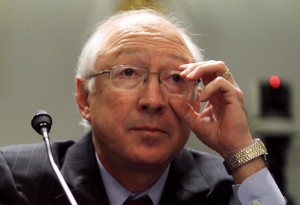Industry Objects to Federal Plans to Regulate Fracking on Public Lands
-
Susan Phillips

Alex Wong / Getty Images
U.S. Interior Secretary Ken Salazar testifies during a hearing before the House Natural Resources Committee in November, 2011.
Interior Department Secretary Ken Salazar says drillers will have to comply with new rules when it comes to fracking on public lands. Salazar told a group in Cleveland this week that those rules would include well inspections after the fracking is completed to insure no damage occurred to drinking water supplies. When questioned on Capitol Hill this week during a Congressional hearing, Salazar says drillers want consistency from state to state when it comes to regulations.
But industry executives representing major trade associations, say they want to leave regulations up to the states, not the federal government. The group, including the heads of the American Petroleum Institute, America’s Natural Gas Alliance, and the Independent Petroleum Organization of America, wrote a letter to the House Natural Resources Committee.
“We, the undersigned organizations, want to explicitly state that our member companies support the current state processes for regulation of hydraulic fracturing. More importantly, we have repeatedly requested that the Department of Interior utilize the state operated FracFocus reporting system instead of attempting to create a different, costly and unnecessary new reporting process.”
The Interior Department’s Bureau of Land Management leases land for oil and gas production, mostly on public lands out west and in Alaska. The BLM has 67 current oil and gas leases in Pennsylvania, but covering a total of 4,718 acres, they constitute a small fraction of the land being drilled in the state. The BLM has allowed for only six new wells to be drilled in Pennsylvania in the past two years. But Salazar told the House Natural Resources Committee that his department’s rules should serve as a standard that states should adopt.
















